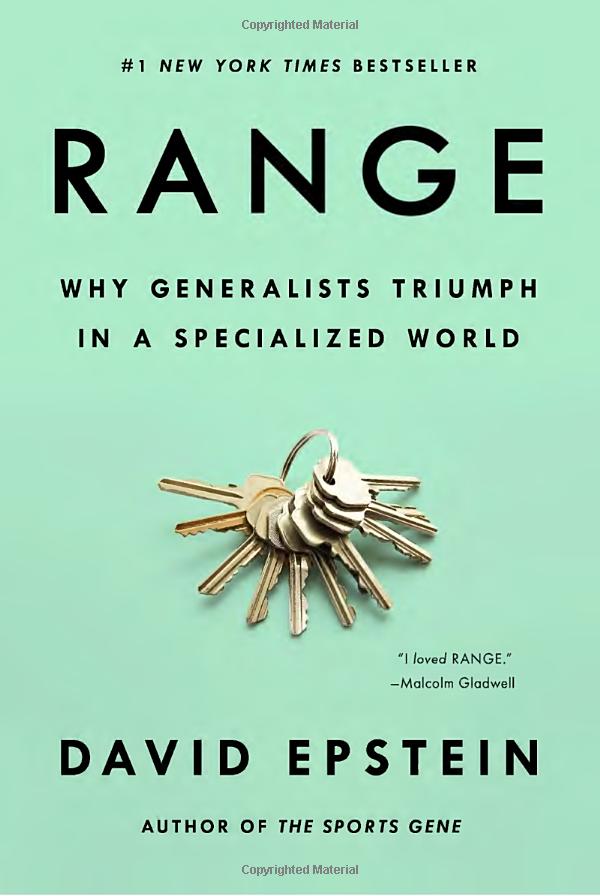I must say I have been influenced by the 10000 hours of focussed practice theory and the concept of deliberate practice that I have written about before. The idea of consciously trying to improve and make fewer mistakes by working on technique by getting regular feedback sounds pretty intuitive. Stories of childhood prodigies like Tiger Woods, the Williams sisters, and countless more, who dedicated themselves to a specific thing, from an early age and achieved greatness, has made this theory really popular amongst parents. This idea that children need to dedicate themselves to one sport, one instrument, one art form, etc, is probably overrated. I recently bumped into the book Range by David Epstein and it challenges, or rather adds more color and context, to the deliberate practice theory.

The key concept discussed in Range is that hyper-successful people seem to have a broader range of experiences than others. There is a lot of nuances here so please bear with me. The author starts talking about two radically different approaches that led to two different greats in different sports. Tiger Woods who began playing golf at the age of 2 and Roger Federer who played a plethora of sports when he was young. The parents of these two superstars could not be more different. Tiger Woods’ parents dedicated themselves to Tiger’s golfing pursuits and Roger’s parents really couldn’t care less about which sport he played as long as he was enjoying himself. While Tiger’s success was built on a single-minded dedication to golf, Roger’s success is built on him leveraging experiences from playing different sports when he was young. It is not to say that he did not dedicate himself to Tennis, the way Tiger did to golf, which he did. Just that this focussed dedication came in much later after he had sampled enough sports and ultimately made the choice of Tennis.

Range builds over this idea of initial sampling period where people who experience more instruments, sports, vocations, etc, generally end up becoming better than their other peers at a later age. The idea is that they regularly borrow experiences from other vocations and apply them in areas that seem unrelated. One interesting statistic that is brought up is that of scientists who achieve acclaim are more likely to be involved in other avocations like drama, poetry, writing, art, etc than other scientists. Those scientists who win Nobels are even more likely, in fact 22 times more likely to be involved in activities similar to those mentioned above. This is not an accident and having a breadth of experiences is a far better indicator of success than singular dedication.
This is because the real world is a more complex sport than golf and tennis. Someone compared the real world to Martian Tennis. Imagine playing a sport where you don’t often know the rules, where some rules can be bent and some broken and some apply to people differently and everything is constantly changing. Having more patterns to match and techniques to borrow ideas from is a powerful weapon to have in one’s arsenal. You can get extraordinarily good by doing deliberate practice in a narrow field but if you want to be good at the constantly changing complex world, you need to become a lot more of a generalist.
In a study, it was observed that seasoned accountants were found to be worse than novices when a new tax law was introduced. Similar was the case observed with seasoned Bridge players as they faltered more than newbies when the order of the play was changed. This is called cognitive entrenchment and you need to find your way around it.
We often underestimate the importance of breadth of experience and overestimate pattern matching and superficial similarities in solving problems. In the real world, we can take inspirations from a variety of fields, some of which often seem unrelated. There are several successful examples of how organizations leverage outsider’s views to solve some of their most daunting problems. Innocentive is a platform that helps organizations post their hairiest problems online and let anyone take a shot at them. Innocentive most famous example is the NASA challenge for forecasting solar events which had remained unsolved for over three decades and remained a grave danger to astronauts. The challenge was posted in 2009 and within six months it was solved by a retired engineer in rural New Hampshire. Another famous example was how an oil industry outsider helped in the cleanup of the Exxon Valdez oil spill.
All of these examples point towards the advantages of having an outsider’s view. We can all benefit from gaining broader experiences from a variety of different fields and building ‘range’ could be a matter of great competitive advantage.
I run a startup called Harmonize. We are hiring and if you’re looking for an exciting startup journey, please write to jobs@harmonizehq.com. Apart from this blog, I tweet about startup life and practical wisdom in books.